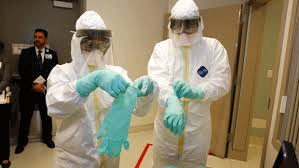Twin Cities Hospital prepares for Ebola virus
Staff is well-prepared to handle patients exhibiting symptoms, says chief nursing officer

Ebola care workers don protective gear before caring for a patient. Photo courtesy of the CDC.
With the recent Ebola scare, the staff at Twin Cities Community Hospital in Templeton is prepared in the unlikely event that anyone shows up with Ebola virus symptoms in north county. Chief Nursing Officer Carol Howland said that the first thing they do when a patient enters the hospital is ask them about recent travels and what symptoms they have.
“We feel that over the last two weeks we’ve done a deep dive and are very well prepared,” Howland said.
She said Ebola symptoms present themselves within two to 21 days of exposure. Those symptoms, according to the World Health Organization, include fever, fatigue, muscle pain, headache and sore throat followed by vomiting, diarrhea, rash, symptoms of impaired kidney and liver function and, in some cases, both internal and external bleeding.
“We feel it’s a low probability [that anyone will present with Ebola symptoms locally] but we want [the community to know] we want to protect them,” Howland said.
Once it is determined that someone could potentially be infected with Ebola at the hospital in Templeton, the health supervisor would bring a kit that includes protective gear for both the patient and supervisor. After donning the protective gear, the patient would be isolated and then the county public health department notified, who will then likely notify the Centers for Disease Control and Prevention.
According to the World Health Organization, Ebola is spread through direct contact with blood secretions, organs or other bodily fluids of infected people and with surfaces and materials contaminated with these fluids. Howland said that it is not known how much body fluid infects a person.
“That’s why it’s so important not only to have the patient isolated, but also to have the staff protected,” Howland said. “We’re also reviewing with all our staff how to don and doff protective gear.”
In order to protect staff, hospital staff has taken inventory of the hospital’s supply of protective gear: gowns, hoods, masks and gloves, as well as implement staff training and education.
“We are constantly enhancing our equipment and education,” Howland said.
Ebola is often a fatal illness, though the average case fatality is about 50 percent. Though the first Ebola outbreaks occurred in remote villages in Central Africa, there have been three confirmed cases to date in the United States. The first confirmed on Sept. 30 in Dallas, Texas.
For more information, see CDC information on Ebola transmission: http://www.cdc.gov/vhf/ebola/transmission/index.html?s_cid=cs_3923






















